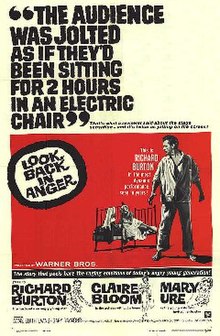Look Back in Anger (1959 film)
| Look Back in Anger | |
|---|---|

Theatrical release poster
|
|
| Directed by | Tony Richardson |
| Produced by |
Harry Saltzman Gordon Scott |
| Written by |
Nigel Kneale John Osborne |
| Starring |
Richard Burton Claire Bloom Mary Ure Edith Evans |
| Music by | Chris Barber |
| Cinematography | Oswald Morris |
| Edited by | Richard Best |
| Distributed by | Warner Bros. |
|
Release date
|
15 September 1959 |
|
Running time
|
98 minutes |
| Country | United Kingdom |
| Language | English |
| Budget | £250,000 |
| Box office | $1.1 million (est. US/ Canada rentals) |
Look Back in Anger is a 1959 British film starring Richard Burton, Claire Bloom and Mary Ure and directed by Tony Richardson.
It is based on John Osborne's play of the same name about a love triangle involving an intelligent but disaffected young man (Jimmy Porter), his upper-middle-class, impassive wife (Alison), and her snooty best friend (Helena Charles). Cliff, an amiable Welsh lodger, attempts to keep the peace.
The character of Ma Tanner, only referred to in the original play, is here brought to life by Edith Evans as a dramatic device to emphasise the class difference between Jimmy and Alison. The film and play are classic examples of the British cultural movement known as kitchen sink realism.
The black-and-white film opens with a close-up on Jimmy Porter performing on trumpet in a crowded, smoky jazz club (titles over). Having finished to a round of applause, he goes over to his friend Cliff, sitting at a front row table, but his friend waves him off in dumb-show, being more intent on winning the affections of a woman. (The real Chris Barber jazz band is visible in the background). Scenes of Jimmy walking home through the depressing streets of a Midlands industrial town (Derby) serve to give the film its overall visual context.
Arriving home at their attic flat, he surreptitiously goes through his sleeping wife's handbag before getting into bed with her. It is not until seven minutes into the film that the first lines of dialogue are spoken. The next morning, with a train rattling past the open window, Jimmy wakes up and walks into Cliff's room. He complains that Alison is writing secret letters to her mother – conspiring against him, as he sees it.
The next scene is set on Sunday morning, with Alison at the ironing board and Jimmy and Cliff reading the newspapers. His derision of her family is evident. Jimmy and Cliff start the 'where's nobody?' Music Hall sketch, but Alison doesn't play along and the scene ends in horseplay, with Alison getting a burn as the ironing board is overturned.
...
Wikipedia
